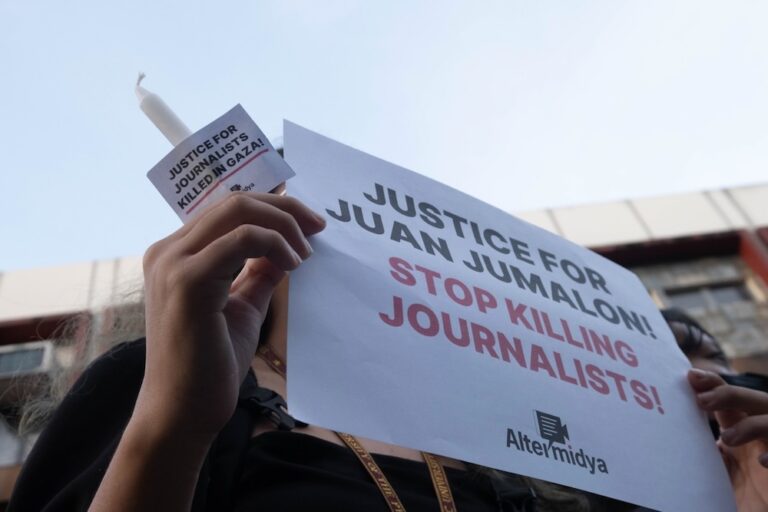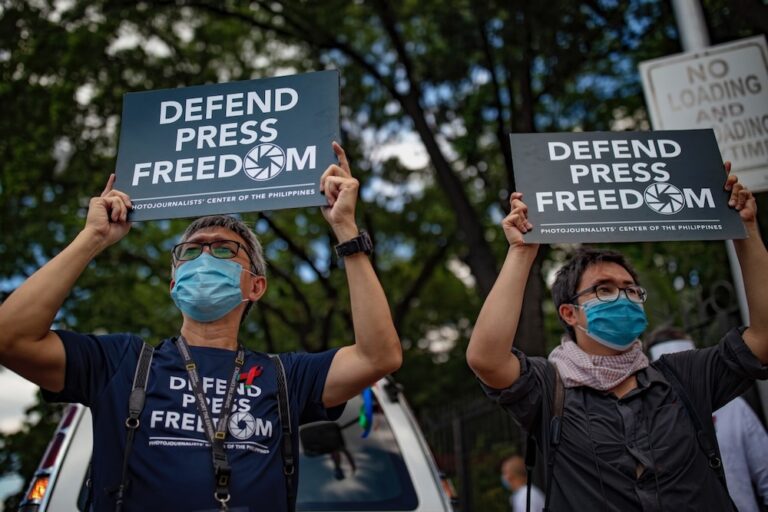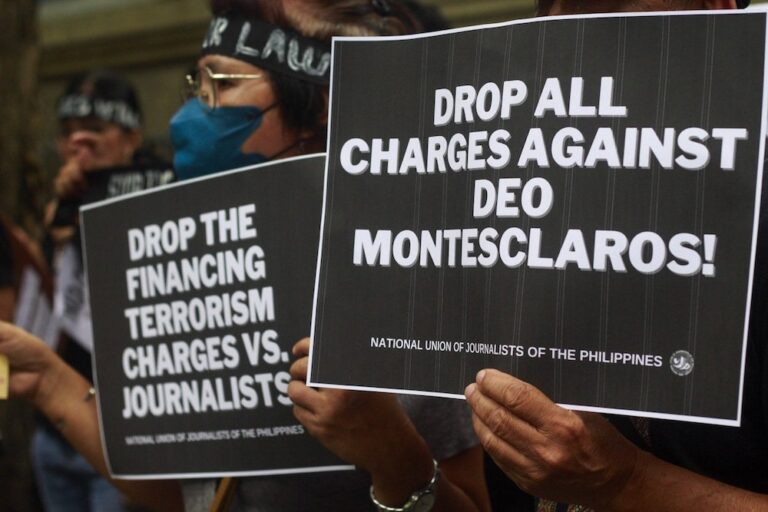(CMFR/IFEX) – On 11 January 2005, at dawn, unidentified armed men stormed and set on fire an outside broadcast (OB) van of local network giant ABS-CBN. The incident took place in Mandaluyong City. The OB van, which is worth about P35 million (approx. US$625,000), was parked at a local gasoline station at around 4:25 a.m. […]
(CMFR/IFEX) – On 11 January 2005, at dawn, unidentified armed men stormed and set on fire an outside broadcast (OB) van of local network giant ABS-CBN. The incident took place in Mandaluyong City.
The OB van, which is worth about P35 million (approx. US$625,000), was parked at a local gasoline station at around 4:25 a.m. (local time), when a group of armed men got out off a private passenger van and held five of the eight-man crew of the ABS-CBN’s mobile studio to the ground.
After setting the ABS-CBN van on fire using a Molotov cocktail, the group fled aboard their vehicle. No one was injured, nor was anything stolen, except for the driver’s mobile phone, which was taken to prevent the victims from calling for help.
Initial investigations by police and the National Bureau of Investigation (NBI) ruled out robbery as a motive for the crime, and added that the attack was planned and precise.
Later on the morning of 11 January, in a statement e-mailed to several broadcast networks, the assailants, calling themselves “K” and using the e-mail address juandelacruz11105@hotmail.com, said they were not out to rob the gasoline station but were intent on targeting the OB van.
The group castigated ABS-CBN for not reporting accurately on the 10 May 2004 elections, and accused the station of “being dead to the public” and listening to “politicians’ greed.”
The group said the attack was an “offering to the late actor and presidential candidate Fernando Poe Jr. (FPJ)” and a response to the “call of the Motherland.”
During the 16 December episode of ABS-CBN’s early night-time news programme “TV Patrol World”, Poe’s widow, Susan Roces, aired her grievances and feelings about what she claimed were the “biases of the media, [particularly ABS-CBN],” against her husband during the national elections.
National Coordinating Council of Volunteers for FPJ (NCCV) Chairman Rez Cortez condemned the incident. He pointed out that no one will benefit from the attack, saying that Poe campaigned for peace and the NCCV will continue to fight through peaceful means. “We condemn the act. If the attackers indeed carry FPJ’s name, they should know that is not how FPJ acts,” Cortez said.
To prevent a repeat of the torching of the ABS-CBN van, the National Capital Region Police Office (NCRPO) met with security chiefs of all television and news networks at 11:00 a.m. on 12 January to discuss security measures for news crews and their equipment during regular news coverage, NCRPO Director General Avelino Razon announced.
“Management is taking precautionary measures to protect the employees and the people working in the field for ABS-CBN. We are now also working with the authorities in the ongoing investigation,” an ABS-CBN statement said.
Meanwhile, legislators and various media organisations denounced the attack.
“It is a daring act of terrorism and violence,” lamented Senator Ramon Revilla Jr., chairman of the Senate Committee on Public Information and Mass Media.
“An attack like this is equivalent, if not more dastardly, [to] an attack against the life of a media person. It makes it more difficult for the Filipino nation and people to [move forward],” said Secretary Cerge Remonde, director of Government-Controlled Media Entities.
“It is obvious that the attack is a cowardly attempt to silence ABS-CBN, which has been a pillar of Philippine media for the last five decades,” National Press Club President Antonio Antonio said.
Kapisanan ng mga Brodkaster ng Pilipinas (KBP) President Jun Nicdao described the situation as “becoming almost like anarchy.”
“The NUJP [National Union of Journalists of the Philippines] looks at [the torching] as a blatant attack on the media. We continue to stand defiant against moves to silence the Philippine media through intimidation, attacks and killings,” said the NUJP in a statement. “With every murder of a journalist or an attack on the media, democracy dies a little,” the NUJP stated.


